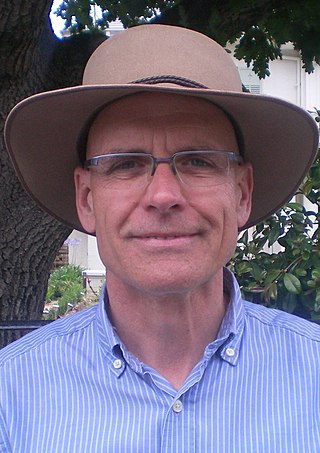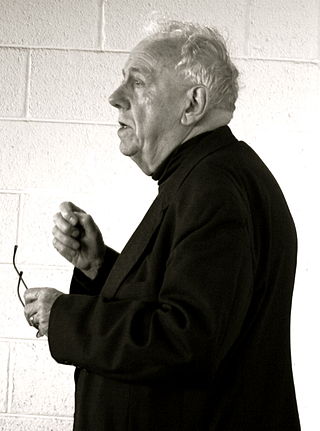Related Research Articles

Henry Sidgwick was an English utilitarian philosopher and economist. He was the Knightbridge Professor of Moral Philosophy at the University of Cambridge from 1883 until his death, and is best known in philosophy for his utilitarian treatise The Methods of Ethics. He was one of the founders and first president of the Society for Psychical Research and a member of the Metaphysical Society and promoted the higher education of women. His work in economics has also had a lasting influence. In 1875, with Millicent Garrett Fawcett, he co-founded Newnham College, a women-only constituent college of the University of Cambridge. It was the second Cambridge college to admit women, after Girton College. In 1856, Sidgwick joined the Cambridge Apostles intellectual secret society.

Clive Charles Hamilton AM FRSA is an Australian public intellectual currently serving as Professor of Public Ethics at the Centre for Applied Philosophy and Public Ethics (CAPPE) and the Vice-Chancellor's Chair in Public Ethics at Charles Sturt University. He is a member of the Board of the Climate Change Authority of the Australian Government, and is the Founder and former Executive Director of The Australia Institute. He regularly appears in the Australian media and contributes to public policy debates. Hamilton was granted the award of Member of the Order of Australia on 8 June 2009 for "service to public debate and policy development, particularly in the fields of climate change, sustainability and societal trends".

Applied philosophy is a branch of philosophy that studies philosophical problems of practical concern. The topic covers a broad spectrum of issues in environment, medicine, science, engineering, policy, law, politics, economics and education. The term was popularised in 1982 by the founding of the Society for Applied Philosophy by Brenda Almond, and its subsequent journal publication Journal of Applied Philosophy edited by Elizabeth Brake. Methods of applied philosophy are similar to other philosophical methods including questioning, dialectic, critical discussion, rational argument, systematic presentation, thought experiments and logical argumentation.

Alasdair Chalmers MacIntyre is a Scottish-American philosopher who has contributed to moral and political philosophy as well as history of philosophy and theology. MacIntyre's After Virtue (1981) is one of the most important works of Anglophone moral and political philosophy in the 20th century. He is senior research fellow at the Centre for Contemporary Aristotelian Studies in Ethics and Politics (CASEP) at London Metropolitan University, Emeritus Professor of Philosophy at the University of Notre Dame, and permanent senior distinguished research fellow at the Notre Dame Center for Ethics and Culture. During his lengthy academic career, he also taught at Brandeis University, Duke University, Vanderbilt University, and Boston University.
Linda Trinkaus Zagzebski is an American philosopher. She is the Emerita George Lynn Cross Research Professor, as well as Emerita Kingfisher College Chair of the Philosophy of Religion and Ethics, at the University of Oklahoma. She writes in the areas of epistemology, philosophy of religion, and virtue theory.

Nicholas Paul Wolterstorff is an American philosopher and theologian. He is currently Noah Porter Professor Emeritus of Philosophical Theology at Yale University. A prolific writer with wide-ranging philosophical and theological interests, he has written books on aesthetics, epistemology, political philosophy, philosophy of religion, metaphysics, and philosophy of education. In Faith and Rationality, Wolterstorff, Alvin Plantinga, and William Alston developed and expanded upon a view of religious epistemology that has come to be known as Reformed epistemology. He also helped to establish the journal Faith and Philosophy and the Society of Christian Philosophers.

Frank Cameron JacksonFBA is an Australian analytic philosopher and Emeritus Professor in the School of Philosophy at Australian National University (ANU) where he had spent most of the latter part of his career. His primary research interests include epistemology, metaphysics, meta-ethics and the philosophy of mind. In the latter field he is best known for the "Mary's room" knowledge argument, a thought experiment that is one of the most discussed challenges to physicalism.

Julian Savulescu is an Australian philosopher and bioethicist of Romanian origins. He is Chen Su Lan Centennial Professor in Medical Ethics and director of the Centre for Biomedical Ethics at National University of Singapore. He was previously Uehiro Chair in Practical Ethics at the University of Oxford, Fellow of St Cross College, Oxford, director of the Oxford Uehiro Centre for Practical Ethics, and co-director of the Wellcome Centre for Ethics and Humanities. He is visiting professorial fellow in Biomedical Ethics at the Murdoch Children's Research Institute in Australia, and distinguished visiting professor in law at Melbourne University since 2017. He directs the Biomedical Ethics Research Group and is a member of the Centre for Ethics of Pediatric Genomics in Australia. He is a former editor and current board member of the Journal of Medical Ethics, which is ranked as the No.2 journal in bioethics worldwide by Google Scholar Metrics, as of 2022. In addition to his background in applied ethics and philosophy, he also has a background in medicine and neuroscience and completed his MBBS (Hons) and BMedSc at Monash University, graduating top of his class with 18 of 19 final year prizes in Medicine. He edits the Oxford University Press book series, the Uehiro Series in Practical Ethics.

Luciano Floridi is an Italian and British philosopher. He is the Director of the Digital Ethics Center at the Yale University. He is also a Professor of Sociology of Culture and Communication at the University of Bologna, Department of Legal Studies, where he is the director of the Centre for Digital Ethics. He is adjunct professor, Department of Economics, American University, Washington D.C. He is married to the neuroscientist Anna Christina Nobre.

Geoffrey Sayre-McCord is an American philosopher who works in moral theory, ethics, meta-ethics, the history of ethics and epistemology. He teaches at the University of North Carolina, Chapel Hill. He is also the director of the Philosophy, Politics and Economics Society.
The Centre for Human Bioethics is the previous name of a research and teaching centre at Monash University, based in the Faculty of Arts. The Centre is now known as the Monash Bioethics Centre. It focusses on the branch of ethics known as bioethics, a field relating to biological science and medicine. It was founded in October 1980 by Professors Peter Singer and Helga Kuhse, as the first centre in Australia devoted to bioethics, and one of the first in the world.
The Centre for Applied Philosophy and Public Ethics (CAPPE) was a research center at Charles Sturt University and the University of Melbourne. CAPPE ceased operation on 31 December 2016. Its website has been archived and the academic staff and research projects have transferred to the Faculty of Arts and Education at Charles Sturt University.
Thomas (Tom) Douglas Campbell (1938–2019) was a Scottish philosopher and jurist. He held academic positions in Scotland and Australia, and was a professorial fellow of the Centre for Applied Philosophy and Public Ethics (CAPPE) in Canberra.
Roger Stephen Crisp is fellow and tutor in philosophy at St. Anne's College, Oxford. He holds the university posts of Professor of Moral Philosophy and Uehiro Fellow and Tutor in Philosophy. His work falls principally within the field of ethics, in particular metaethics, normative ethics, and applied ethics. In addition, he is chairman of the Management Committee of the Oxford Uehiro Centre for Practical Ethics.
John Tasioulas is a Greek-Australian moral and legal philosopher. He is the inaugural Director of the Institute for Ethics in AI, and Professor of Ethics and Legal Philosophy, Faculty of Philosophy, University of Oxford. He holds dual Australian and British citizenship.
Mark Johnston is an Australian-born philosopher working at Princeton University.
Maxwell John Charlesworth AO FAHA was an Australian philosopher and public intellectual. He taught and wrote on a wide range of areas including the philosophy of religion and the role of the Church in a liberal democratic society; Australian Aboriginal culture and religions; European philosophy from medieval to continental; bioethics and modern science’s role in society; and the philosophy of education. In 1990, he was made an Officer of the Order of Australia for his contributions to Australian society in the fields of education and bioethics.
Philosophy of conspiracy theories is the academic study by philosophers of the phenomenon and history of conspiracy theories. A conspiracy theory has been defined as an explanation for an event or situation that invokes a conspiracy by sinister and powerful groups, often political in motivation, or more narrowly a conspiracy where other explanations are more probable. The term has a negative connotation, implying that the appeal to a conspiracy is based on prejudice or insufficient evidence.

Holly Lawford-Smith is a philosopher, scholar, researcher, author and Associate Professor in Political Philosophy, University of Melbourne.

Applied epistemology refers to the study that determines whether the systems of investigation that seek the truth lead to true beliefs about the world. A specific conceptualization cites that it attempts to reveal whether these systems contribute to epistemic aims. It is applied in practices outside of philosophy like science and mathematics.
References
- ↑ Austlit: C A J Coady. Retrieved 13 September 2014
- ↑ "Fellow: Tony Coady". Australian Academy of the Humanities. Archived from the original on 19 July 2018. Retrieved 2 October 2020.